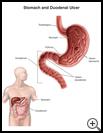
Ulcer in the Stomach (Gastric Ulcer)
________________________________________________________________________
KEY POINTS
- A stomach ulcer is a raw place or sore in your stomach that happens when the protective layer in the stomach lining breaks down.
- Your healthcare provider may give you medicines to treat an infection, to decrease the acid in your stomach, or to coat and protect your stomach lining. If the ulcer is severe, you may need surgery.
- Ask your healthcare provider how to take care of yourself at home, what symptoms or problems you should watch for, and what to do if you have them.
________________________________________________________________________
What is a stomach ulcer?
A stomach ulcer is a raw place or sore in the lining of your stomach. It’s also called a gastric ulcer or peptic ulcer.
What is the cause?
The lining of the stomach normally keeps the stomach from being hurt by stomach acid and digestive juices. If this protective layer breaks down, stomach acids can damage the walls of your stomach and cause an ulcer. You may get an ulcer when:
- You have bacteria called Helicobacter pylori (H. pylori). These bacteria are the most common cause of ulcers. When H. pylori bacteria infect the stomach, the infection can weaken the lining of the stomach.
- You regularly take nonsteroidal anti-inflammatory drugs (NSAIDS), such as aspirin, ibuprofen, naproxen, or ketoprofen. These medicines irritate the lining of the stomach and upper intestine, making it easier for stomach acid to damage the lining.
- Your stomach makes too much acid.
While they may not cause ulcers, some things may make ulcers worse, increase pain, or slow ulcer healing, such as:
- Smoking cigarettes or chewing tobacco
- Drinking alcohol
- Eating spicy foods
- Eating food with a high acid content, such as oranges or tomatoes
- Drinking coffee and colas
- Stress
You are more likely to get a duodenal ulcer if you have a family history of ulcers. Men and older adults are more likely to get stomach ulcers.
You have a greater risk of getting stomach cancer if you have a history of ulcers or of having an infection from H. pylori bacteria.
What are the symptoms?
Symptoms may include:
- A burning pain or dull ache in the belly that may:
- Come and go
- Come when your stomach is empty
- Happen in the middle of the night
- Get better when you eat something
- Loss of appetite
- Bloating and burping
- Feeling sick to your stomach and vomiting
- Weight loss
- Black or bloody bowel movements
- Vomit that is bloody or looks like coffee grounds
How is it diagnosed?
Your healthcare provider will ask about your symptoms and medical history and examine you. Tests may include:
- Blood tests
- A test to look for H. pylori
- Tests of a sample of bowel movement to check for blood
- Barium swallow, which is an X-ray taken of the upper part of your digestive tract after you swallow barium. Barium is a liquid that helps ulcers show up well on the X-ray.
- Endoscopy, which uses a slim, flexible, lighted tube passed through your mouth to look at your stomach and upper intestine. A biopsy may be taken to help make a diagnosis. A biopsy is the removal of a small sample of tissue for testing.
How is it treated?
Treatment can cure an ulcer and prevent complications. Treatment may also keep you from getting another ulcer. Your healthcare provider may prescribe:
- Antibiotics to treat H. pylori bacteria
- Medicine to lower the acid in your stomach
- Medicine that coats and protects the lining in your stomach and intestine from acid
You may stay in the hospital if your symptoms are severe. If you have a lot of bleeding, a hole through your stomach wall, or a blockage in your stomach or intestines, you may need surgery.
Some medicines used to treat ulcers can hurt an unborn baby. Tell your provider if you are pregnant, are thinking of getting pregnant, or if you get pregnant while being treated for an ulcer.
How can I take care of myself?
- Take your medicines exactly as prescribed.
- Follow the diet prescribed by your healthcare provider. Avoid any food or drink that seems to bother your stomach, such as spicy foods; acidic foods like oranges or tomatoes; and tea, coffee, and cola.
- Avoid alcohol, cigarettes, and chewing tobacco because they slow the healing of ulcers. If you smoke, try to quit. Talk to your healthcare provider about ways to quit smoking.
- Ask your provider if you should avoid NSAIDs and use acetaminophen for pain relief instead. If your provider says it’s OK to take these drugs, try taking them with food to help avoid irritating your stomach.
- A healthy lifestyle may also help:
- Try to get at least 7 to 9 hours of sleep each night.
- Stay fit with the right kind of exercise for you
- Try to keep a healthy weight. If you are overweight, lose weight.
- Learn ways to manage stress. Ask for help at home and work when the load is too great to handle. Find ways to relax. For example, take up a hobby, listen to music, watch movies, or take walks. Try deep breathing exercises when you feel stressed.
- Ask your healthcare provider:
- How and when you will get your test results
- How long it will take to recover
- If there are activities you should avoid and when you can return to your normal activities
- How to take care of yourself at home
- What symptoms or problems you should watch for and what to do if you have them
- Make sure you know when you should come back for a checkup. Keep all appointments for provider visits or tests.

